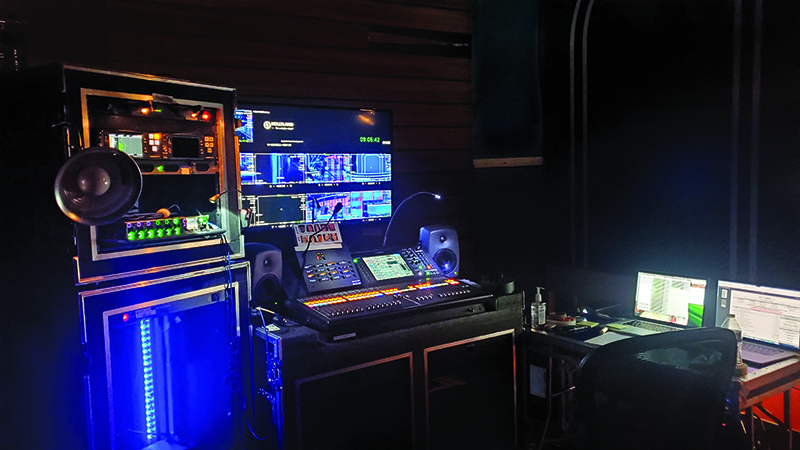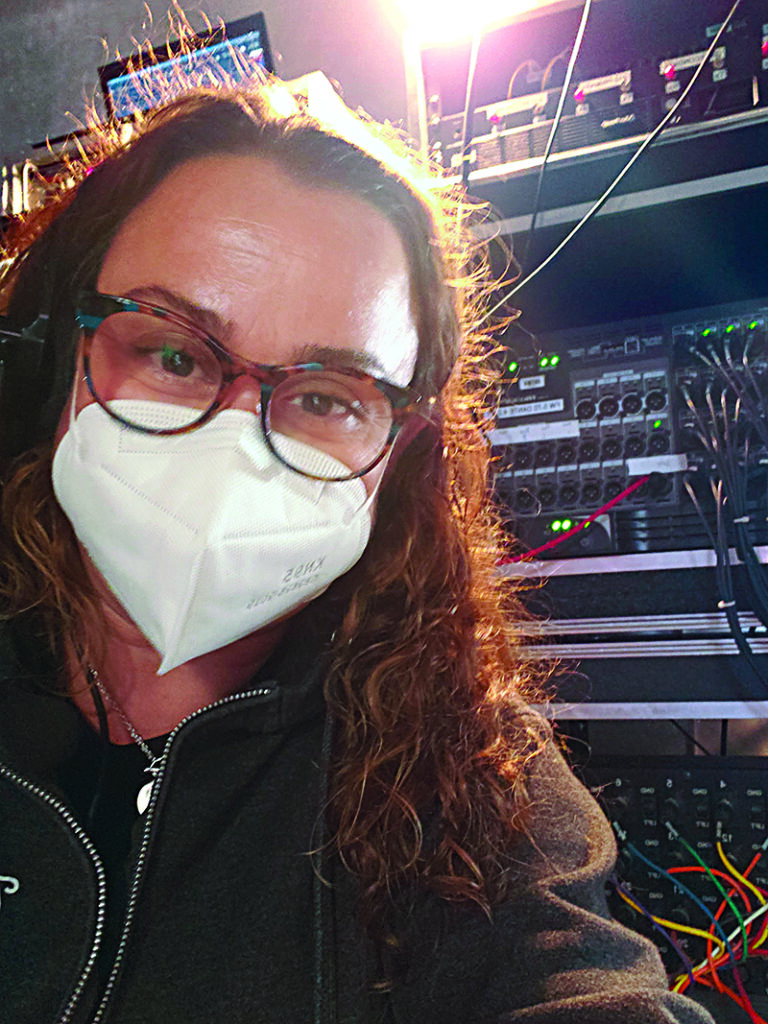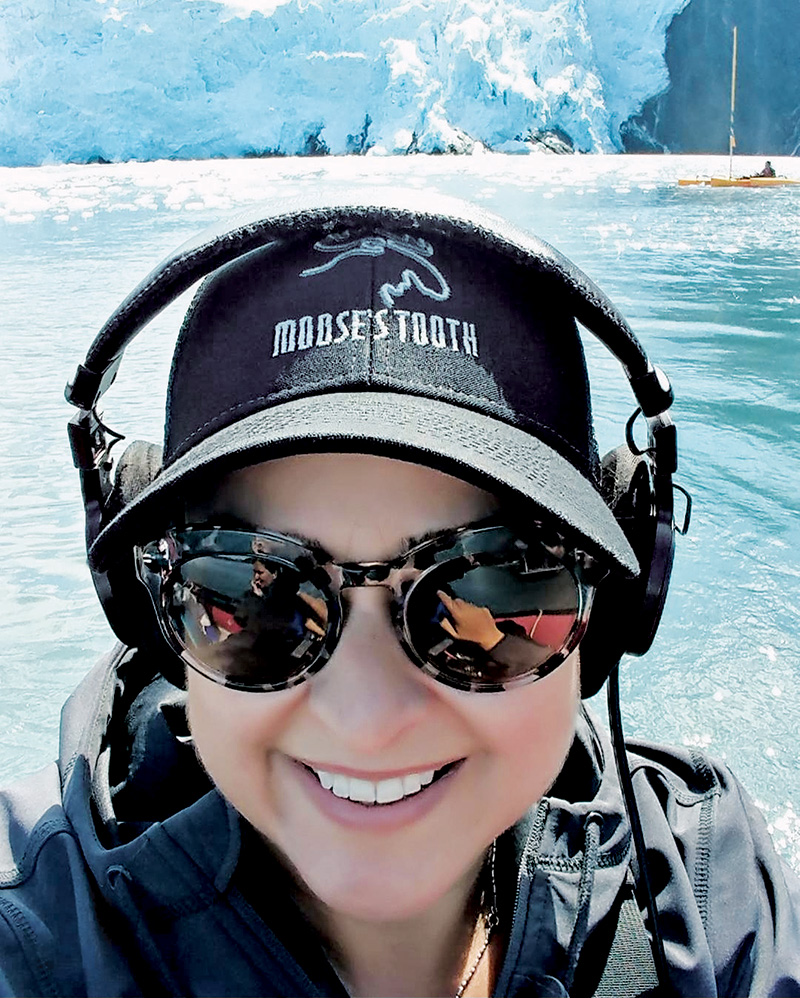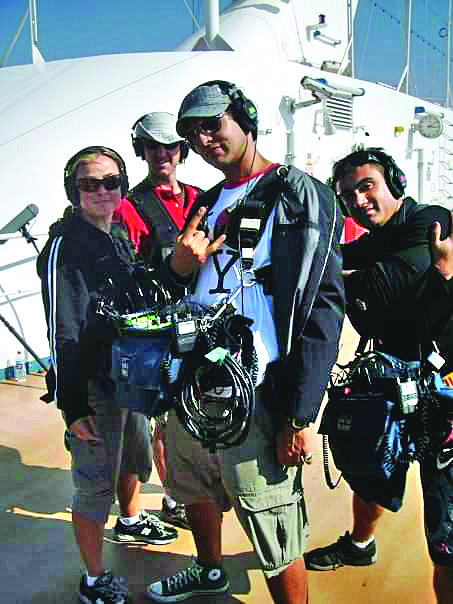conducted by James Delhauer

In the worlds of unscripted and live broadcast productions, filmmakers are rarely afforded a second take. Jobs in these genres require an innate ability to think quickly and creatively in high-pressure situations. The key to success comes from being able to anticipate what might happen and to prepare for a variety of possible outcomes. Even among the well-seasoned and experienced members of the IATSE, this is a rare skill. Recently, I had the pleasure of sitting down with Local 695 member Jenn Raudman, a Mixer and Audio Supervisor. She is known for her work on shows such as American Idol, The Voice, and Is It Cake? We discussed her long and storied career in audio.

Can you tell me a little bit about how you got your start in Hollywood?
Well, I started as a musician. I came out to Los Angeles after I graduated from Berklee College of Music in Boston, MA, where I studied audio engineering and music production. I was working as a Front of House/Monitor Engineer at the House of Blues in Cambridge, MA, and around town mixing bands. I came out to LA and worked for live-sound companies mixing music, one-offs, and live events. A friend of mine from high school was working on a talk show, The Roseanne Show, and referred me over there, where I was hired as an A-2. I really enjoyed working as part of the sound team on that show and kept at it. My career path kind of took off from there and has really been driven by word of mouth and people I work with inviting me onto new projects with them. I have had the pleasure of working in various formats of television, including reality shows/docs, talk shows, and competition reality shows. I primarily work as both an ENG Mixer, Field Mixer, and Board A1/Audio Supervisor. I do pick up music recording and sound-related jobs outside of production every so often as well. I enjoy the variety.
Did your background in audio engineering in music help when you were transitioning into production?
Yes, it did. Audio engineering for recording studios and live sound has led me to many interesting gigs doing sound over the years, many with a musical twist or musical talent involved. It’s part of the reason I split my time between Nashville and Los Angeles. I get calls to work on shoots with recording artists that involve recording music, as well as dialog. I also am a lifelong songwriter and musician, so it is quite fun to be around a community engulfed in music such as Nashville.
Was it mostly music that drew you to the unscripted and broadcast worlds?
I was still playing in bands when I began working in television and it was a solid job for me. I am an audio nerd. I love audio gear and software. For whatever reason, I happen to land on many music-related shows. I am drawn to new environments, traveling all over the world, meeting a variety of people, and having different experiences. I like not being parked in one place and getting to work on different projects.
And what are some of the major challenges that you have to deal with in your field?
If you are freelance or project-driven, you need to be able to acclimate to the feast-or-famine mentality. Not all people are built for that, but the freedom has worked out very well for me. There are some mindsets you must get used to when working in unscripted in particular, that go against an audio person’s inclination to capture superior sound. In unscripted, especially shooting verité, you need to be able to focus on getting the best sound you can at that moment. There are often last-minute changes and we must be able to pivot and make things happen quickly. We are there to think ahead and capture a moment. With unscripted, you don’t get a take two a lot of the time. Environments are rarely ideal and you are challenged with cars driving by honking, random people walk into a scene, doors slamming, etc. So, you really need to choose your battles wisely and know how to make the best of whatever situation you’re in. Story is king and this is to be expected. We’re just trying to get the best, cleanest, most intelligible audio that we possibly can.
So, how creative do you have to be when it comes to problem-solving on set? What are sort of the tricks of the trade for?
Well, I would say one of the biggest things that you need to try and do is to foresee the possibility of various situations playing out and making accommodations for them. If you’re good at that, then you can prepare yourself if things change quickly. If creative springs something on you, like adding more cast members than planned or elements to capture, be ready to act. Carry around lots of gadgets to help with these tasks.

Have you ever had a big, heroic moment on set where it’s like, “I saved the day!”?
On occasion. For example, I was on one shoot once where something went wrong with the media and they lost a ton of footage, so they were able to use the audio to cut the story together without having all the video and salvage the day with that. That was a bit excessive, so they truly needed the audio record from my bag that was not part of the camera’s onboard audio.
How do you feel about all of the changes in gear and equipment? Is that something that really impacts you in your fields?
Oh, absolutely. I enjoy learning something new, new tech, new gear. I spend a lot of time keeping up to date. I always look forward to new technology and gear that can make our jobs easier to manage, higher quality recordings, open doors of possibility, etc. Of course, how will AI (artificial intelligence) change things? I’m not focusing right now on AI robots taking my job in television production. Audio folks that are younger may have to deal with all those changes if they change job positions. I’m trying to focus on using AI as a tool instead of it replacing a human being.
How do you feel a job in this career has impacted your family life?
Well, I’m married now and we do have a family, even though they have four legs. I think it’s really important that everybody finds their threshold for what works for them and the balancing act of work and how much time they can spend with their family. As much as I love doing this, my family means a lot to me. I also like being available for my parents as they get older and certainly being freelance has allowed for that. But it can be a challenge.

Last question. You mostly work under the Videotape Agreement and we have our major contract negotiations coming up later this year. Is there anything you’d like to see change or develop as we go into negotiations?
I would. I would like to see our wage increases tied more closely to the increased cost of living (COLA) and using metrics such as the consumer price index (CPI), adjusting for inflation, etc. It would make our wage increases more logical.
I would like to thank Jenn for taking the time to sit down and speak with me about her job, her career, and her family. I’d also like to thank her and all those who work in her field for producing the amazing content that makes all of our lives just a little bit more musical.